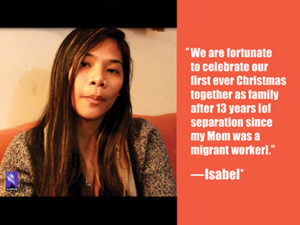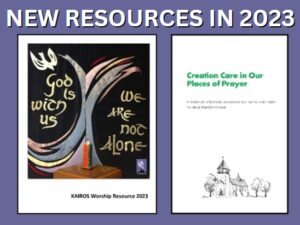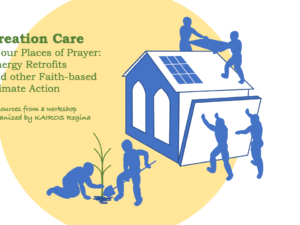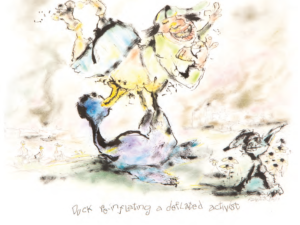Spirited Reflection: God hears children—from the beginning

This year, KAIROS Epiphany and spirited reflections are focusing on children, based on the new Epiphany Resource Listen to the Children: A Worship Resource for Justice Seekers (digital) (print) et Écoutez les enfants.
“I was born here. This is the only place I have known in my lifetime and we are happy here. It is not right to displace us to pave the way for a huge development project that will benefit the already privileged group of people.” These are Rosalie’s* emphatic words after sharing her fears in the looming displacement and relocation of her fishing community in Sitio Dapdap, Barangay Taliptip, Bulacan, Philippines. (*not her real name)
Children play a prominent role in the book of Genesis, unlike many other biblical books where children are virtually absent. God promises Abraham that he will be the father of a great nation, and so the birth of children is an important theme, made even more so by the “barrenness” of Sarah, Rebekah and Rachel. Children are the fulfillment of promise and a source of great joy. But children are also very vulnerable in Genesis.
In Genesis for example, we encounter the story of Ishmael. The son of Sarah’s slave-girl Hagar, Ishmael is not the child promised to Abraham and his wife Sarah. Indeed, even though it was Sarah’s idea in the first place that Abraham have a child with Hagar, since she herself is unable to bear a child, she turns her back on Hagar and Ishmael after Isaac is born. Sarah insists Abraham banish Hagar and Ishmael to the wilderness, and he does so.
In the hot desert, the small skin of water Abraham provided for Hagar and Ishmael is quickly emptied. Death is certain. Hagar places her young son under a bush to die and removes herself a short distance where she lifts her voice in loud lamentation. God hears the voice of Ishmael himself and God’s angel assures Hagar that God will make a great nation of Ishmael – that is, he will not die – and God provides water so that the mother can save the life of her son. We read, further, that God was “with the boy” and he grew and married.
This story is important in several ways. First, it emphasizes that God hears the cry of a child even before the cry of a parent. The text tells us that although Hagar is the one who lifted her voice and wept, God “heard the voice of the boy” (Gen 21:17). Only after hearing the boy does God’s angel address Hagar. God is a God who hears a child’s cry.
Second, Ishmael is a marginalized child. The son of a foreign slave, he is not the child of God’s promise to Abraham; he is the “unchosen” one. Indeed, after Isaac is weaned, Ishmael is no longer welcome. He and his mother are cast out of Abraham’s community. Yet God responds to this hungry, thirsty, rejected and homeless child. God’s compassion includes the outsider – the very one God’s people have rejected.
Finally, God does not miraculously rescue Ishmael alone. Rather, God opens the eyes of Hagar so that she can see the water source nearby. Perhaps her grief and desperation have closed her eyes to the presence of life-giving water; perhaps God has made the water appear. In any case, Hagar fills her vessel, gives Ishmael a drink, and he lives. God uses a human agent, a mother, to restore Ishmael to health and strength.
The story invites us to ask: Who are the Ishmaels who cry out to God today?
- Perhaps they are Palestinian children and youth who languish in Israeli jails – often because they have thrown stones at Israeli soldiers, the symbols of their ongoing oppression.
- Perhaps they are the young girls who have been raped by Congolese militia in a violent context where rape is a regular weapon of war.
- Perhaps they are young Indigenous girls here in Canada, murdered or missing in an ongoing genocide against Indigenous peoples.
Whoever the Ishmaels are today, we can be assured that God hears their cry.
The question is: will we? Will we open our ears – and our hearts – to hear the cry of marginalized, excluded and “unchosen” children and youth? And will we open our eyes to see the saving resources God provides?
This reflection draws on the work of Terence E. Fretheim, “ ‘God Was with the Boy’ (Genesis 21:20): Children in the Book of Genesis,” in Marcia U. Bunge, general editor, The Child in the Bible (Grand Rapids, Michigan: Eerdmans, 2008), pp. 3-23.
With thanks to the KAIROS Epiphany Team, including all the child consultants and Shannon Neufeldt, to Esther Epp-Tiessen for this reflection. Esther Epp-Tiessen is the former MCC Ottawa Office Public Engagement Coordinator for Mennonite Central Committee Canada (MCC) in peace and justice advocacy. When in Treaty 1 Territory and Homeland of the Metis Nation, she loves to walk, read and write and hunt for wildflowers in the spring.











